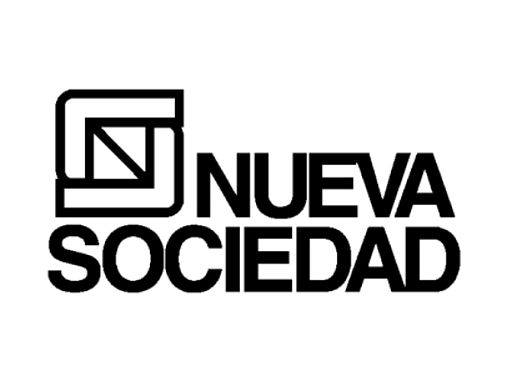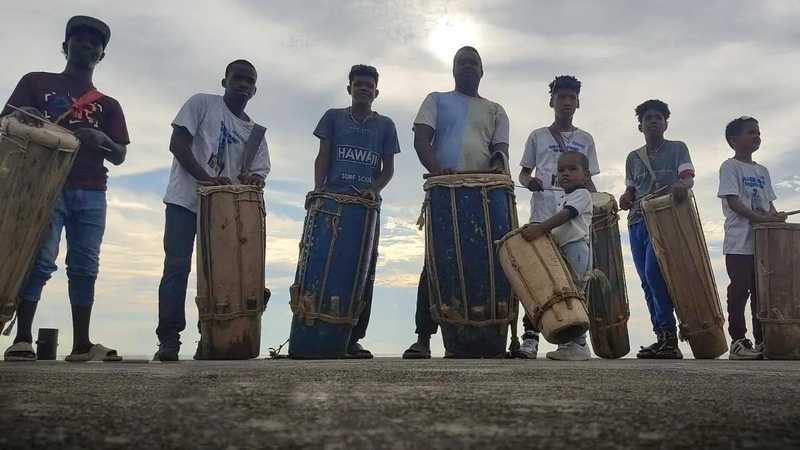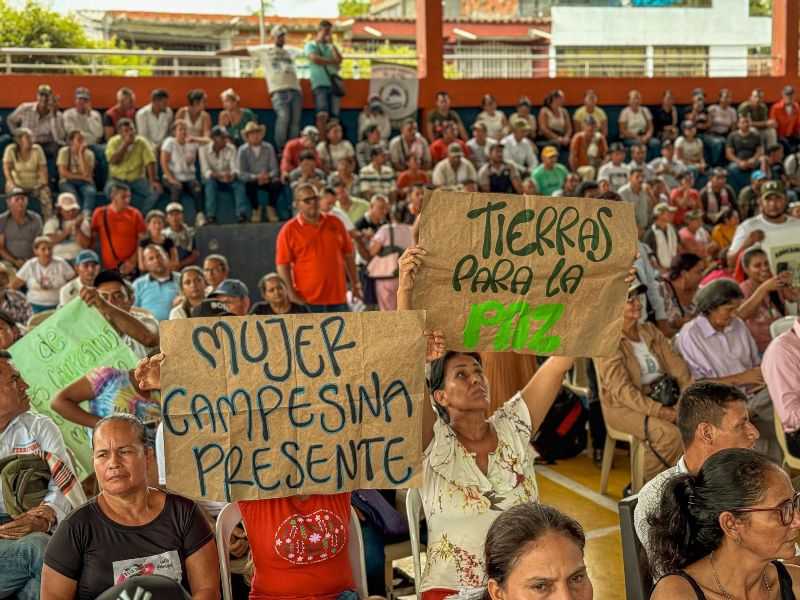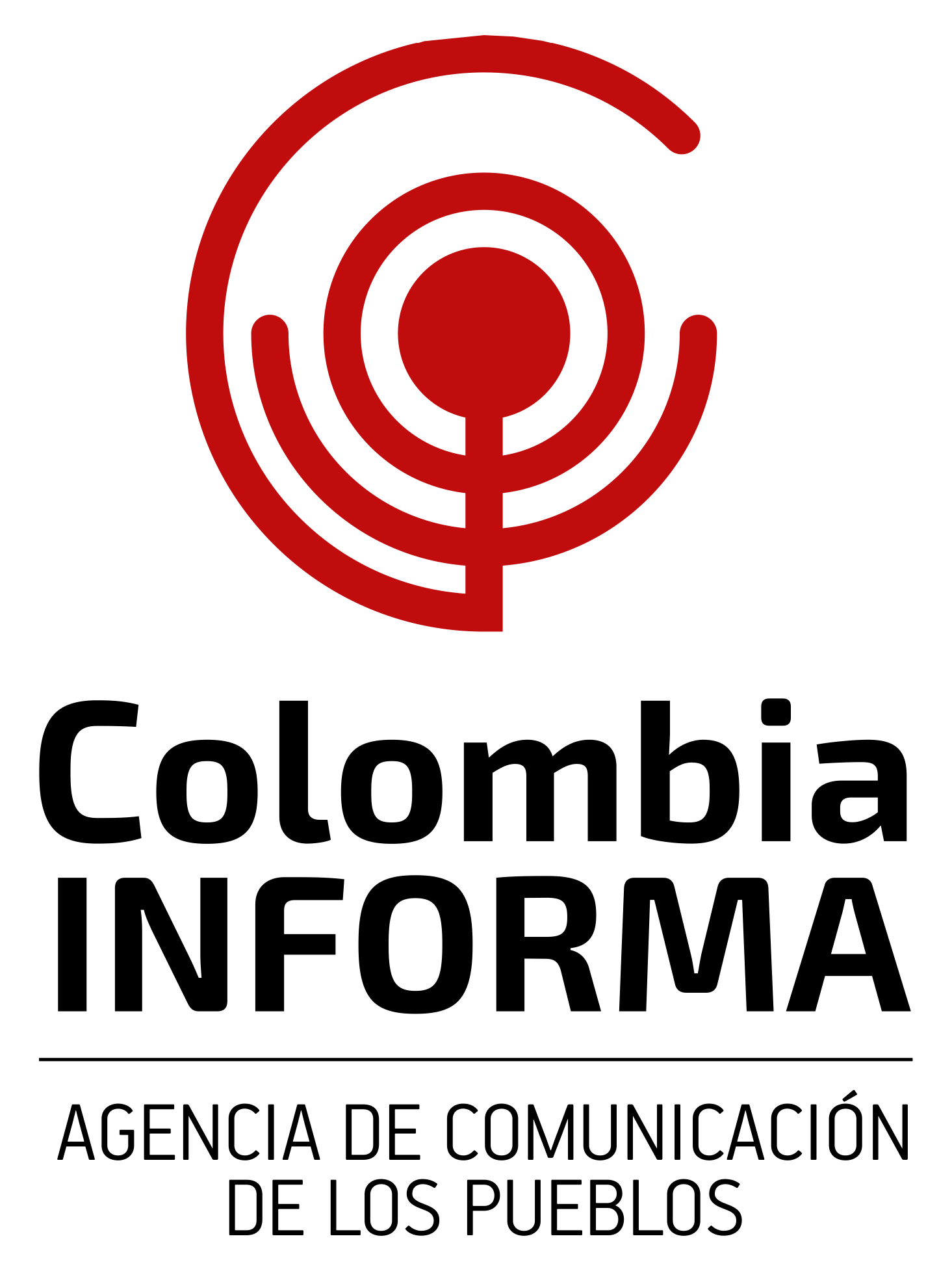
The appearance of the modern nation-state in Latin America had a devastating effect on the Indigenous peoples of the region. The processes of extermination, marginalization and the search for assimilation were compounded by the invisibilization of their practices, which were subsumed under the state-centric hegemony. This was also evident in the international sphere, where a system of relationships based on the ideas and practices of state sovereignty was established. The so-called Eurocentric "Westphalian order" was replicated in the Americas, and the state became its guarantor through the exclusive exercise of sovereignty over territories defined by borders built according to specific interests, as well as through the formal diplomatic representation of that sovereignty in the international sphere. However, the weakening of the power of the state in the face of economic and social forces as well as before other international actors has undermined the prevailing order and permeated the borders that define it. In the case of Indigenous peoples, despite their historical invisibility, they maintained their traditional relationships across the Westphalian borders and, more recently, they have acquired an increasingly more prominent role in the international political sphere.
In Latin America, despite the aforementioned changes, many of the countries maintain outdated border practices based on the traditional model of sovereignty. Thus, while nation-states continue to reinforce their borders--and even close them in the context of the COVID-19 pandemic--it is clear that the impact of these efforts is counterproductive for those who inhabit these spaces and relate historically and on a daily basis across borders, as is the case of Indigenous peoples. Contrary to the idea of sovereignty, the practices and relationships of these peoples contribute to crisis management in border contexts, which demonstrates the futility of these limits, steeped in exclusively state-centric ideas, and highlights the importance of questioning the make-up of national and international systems.
Indigenous Diplomacies and Questioning the "International Order
The so-called "international order," established on the basis of the idea and practice of state sovereignty--characterized by the exclusive exercise of governmental authority within geographically defined spaces through the legal limits of the territory--has been called into question. This is due to the ideas and practices of Indigenous peoples as well as to their recognition by international organizations which are, paradoxically, constituted by the nation-states themselves. Many Indigenous peoples inhabit spaces that include the limits or borders of two or more countries. These communities--in addition to constantly and historically crossing current borders--share traditions, identities, practices and worldviews that are different from those that constitute the modern nation-state. Although Indigenous practices were made invisible by the nation-state itself, they are increasingly vindicated on a national and international scale.
In fact, there are presently various active indigenous diplomacies which, despite their differences, are characterized by centering on their own ancestral and contemporary beliefs and relationships rooted in the ideas and practices of sovereignty over their land. These beliefs and relationships distinguish them from the state. The “international order” of diplomacy has found itself significantly impacted by these diplomacies. On the one hand, the ideas and practices have been recognized by institutions such as the International Labour Organization's (ILO) Indigenous and Tribal Peoples Convention, known as ILO Convention 169, in addition to the United Nations Declaration of the Rights of Indigenous Peoples (UNDRIP). These instruments represent an important change in the relationship between Indigenous peoples and nation-states, as they recognize their self-determination and consider their right to maintain and develop transborder relations with their own and other peoples. These relationships should be facilitated by the nation-states, including by means of international agreements. On the other hand, these recognitions, alongside the inclusion of Indigenous demands in the global agenda, have contributed to challenging the very notion of sovereignty and have questioned the importance of the borders that have defined the dominant international order. In effect, these instruments have tended to limit the interference and hegemony of the nation-states over their land by facilitating greater interaction among Indigenous peoples in transborder communities located in territories occupied by more than one state.
Additionally, they have allowed Indigenous peoples to have their own seats in various international entities, limiting the exclusivity of state diplomatic representation in the international system. However, despite these advances, nation-states continue to reinforce their territorial sovereignty, imposing norms and regulations on their territories. In this sense, it has been evident that these reassertions of authority are even more violent in borderlands and areas adjacent to jurisdictional borders where the socio-cultural ideas and practices of those who inhabit this land coexist with the ideas and practices of two or more nation-states.
Indigenous Transborder Relations and the (F)utility of Borders
Paradoxically, despite the fact that several governments have signed and ratified ILO Convention 169 and the UN Declaration on Indigenous Peoples, thus recognizing both the rights of Indigenous peoples and their transborder practices, they are still seeking to maintain their existing sovereignty and have even strengthened their borders through security measures.
In Latin America, the only countries that have not ratified ILO Convention 169 are Cuba, El Salvador, Haiti, Panama, the Dominican Republic, and Uruguay, while almost all the countries in the region--except Colombia, which abstained--have passed the Declaration of Indigenous Peoples. Yet, in the majority of Latin American nation-states, borders and adjacent territories continue to be considered under the traditional sovereign logic at the expense of the Indigenous peoples living on that land and in a manner inconsistent with the provisions of the agreements to which they have subscribed internationally.
Whereas since the 1990s, an opening of the border was seen in the region, linked to increasing interdependence as well as the economic policies of the free market, the logic that assigned border control enforcement to state security forces was maintained, with institutional arrangements more or less linked to changes in the regional or global context. In this regard, borders continued to be considered conflict zones or security threats. Although traditional interstate conflict hypotheses began to diminish, security measures to control non-state threats such as organized crime and drug trafficking increased.
Moreover, following the changes in the global strategic context from events such as the September 11 attacks, the regional security agenda re-focused its attention with greater intensity against what were considered emerging threats, including various social phenomena that posed possible security threats to Latin American nation-states. Thus, while some saw globalization and interdependence as processes that would lead to a gradual extinction of borders, in fact, border control policies have been fortified through security measures, the building of walls, and even new forms of militarization in the face of emerging threats and other “dangers” that would develop in these areas.
In this context, borders and border policies continue to be perceived as useful instruments not only for the smooth flow of trade and the exchange of goods and services through them, but for the reaffirmation of the authority of the homogeneous nation-state in the face of foreign and domestic dangers. The sovereign and security state view of borders in Latin America excludes other realities that arise in these spaces, but, above all, it impacts the local communities that inhabit them. Such is the case of the Indigenous peoples, who see their ancestral and daily practices disrupted by nation-states’ border control policies. This in turn threatens their rights and infringes on the very international agreements the nation-states have subscribed to.
Transborder Indigenous Dynamics
The dynamism of Indigenous peoples is visible in several transborder zones of the continent and is expressed through everything from family ties, trade, and political and integration associations, to shared worldviews and ideas--on issues such as territory--which differ from state practices and ideas. It is necessary to remember, in this regard, that community relations in settlements predate the nation-state and unfolded in geographic and cultural ways that, in many cases, were abruptly limited by the construction of modern nation-state borders that fragmented Indigenous peoples and sought to “assimilate” and/or marginalize them. Nevertheless, to this day, the region’s Indigenous peoples continue to inhabit these modern-day borderlands and carry out their ancestral and renewed relationships under the current domestic and global conditions.
In Latin America today, in accordance with the Indigenous Territory and Governance Initiative (Iniciativa Territorio Indígena y Gobernanza), there are 108 transborder towns. Among them there are fluid transborder practices between communities that differ from state sovereignty practices and include their own ideas, forms of organization, and relationships. This is the case of the Achuar peoples--separated by the border between Peru and Ecuador-- who besides maintaining their transborder relations, have found themselves in the midst of the exacerbated sovereignty practices of the nation-states where they are located. This was evidenced by the conflict of Cenepa between both countries, during which the Achuar peoples maintained a neutral position. In the case of the border between Colombia and Ecuador, the Awá, Kofan, Pasto, Aecoya, Achuar, Aiona and Wounan peoples maintain significant transborder activities. Among these, the Pasto people’s initiatives stand out. Through plans and strategies, the Pasto promote both the development of trade and the preservation of their worldviews about the territory as well as their own political and cultural norms. On the other hand, partnerships have also been formed between various transborder Indigenous peoples, such as The Transborder Network for the Defense of Ancestral Territories (Red Transfronteriza para la Defensa de los Territorios Ancestrales)--which includes Amazonian communities from Bolivia, Brazil, Ecuador and Peru--or the Transborder Indigenous Peoples Union (Unión de Pueblos Originarios Transfronterizos)--that includes transborder peoples from Panama and Costa Rica. Both initiatives aim to raise awareness about the problems these groups face in the region and formulate proposals to protect their rights.
The Case of Aymara and Mapuche Peoples
In the southern cone of the continent, there are also dynamic transborder links between Indigenous communities. Such is the case of the Aymara and Mapuche peoples who, despite their differences, converge on some complaints regarding international regulations and state relations. In the case of the Aymara people, it is possible to identify formal links of an institutional nature, in which aspects of their organization and the logic of the state mix with the daily dynamics of the communities located between the borders of Bolivia, Chile and Peru. On the one hand, organizations such as the Strategic Alliance of Aymaras Without a Border (Alianza Estratégica Aymaras sin Frontera), an entity that grouped 56 municipalities in Argentina, Bolivia, Chile and Peru, have concentrated on improving the living conditions of the communities that inhabit the borderlands of these countries through international efforts that target central and local governments and communities. Despite the dynamics of this organization during the 2000’s, its activities have declined in recent years. Some of the possible reasons for this decline are lack of support from foreign ministries and the reluctance on behalf of central governments to promote international initiatives that have emerged from local governments, as well as the lack of accountability, project financing and synchrony between local authorities that form part of the alliance and the communities themselves.
On the other hand, despite this, relations between Aymara communities are maintained across borders. The flows of material and intellectual exchange associated with historical and contemporary organizations, family ties, worldviews, etc., persist despite the decline of formalized initiatives and constant state-imposed restrictions. For example, although in recent months official border crossings have been closed due to the COVID-19 pandemic, communities have continued to travel through unauthorized areas, as members of the Apacheta community point out:
“Relationships between neighbors and families, as well as commercial, cultural and spiritual exchanges, have continued despite the barriers erected by governments by connecting through a series of so-called “unauthorized” or “illegal” areas. These routes are part of the history of trade, communication and connection between the communities of the Indigenous Aymara nation. Therefore, border closure measures, based on Western concepts or conceived by the monocultural Chilean state, do not comply with the government’s stated goal of limiting the spread of the illness; rather, by ignoring or obscuring the dynamic local cultures, it generates other impacts that not only affect the physical, mental and spiritual health of families and communities, but their territorial integrity. Additionally, the government does not take responsibility for any of these impacts despite international regulations.“
In the case of the Mapuche peoples, the transborder relations between the communities that inhabit the south-central area of Argentina and Chile, in addition to maintaining ancestral connections, have acquired a growing political, social and cultural dynamism through demanding their rights over the Indigenous Wallmapu territory (from the governments of both countries).
Organizations like the Council of All the Lands (Aukin Wallmapu Ngulam) have promoted the creation of a Mapuche nation in Wallmapu since the 1990s. Others, such as the Coordination of Mapuche Identities and Territories (CITEM), have announced strategies and collective efforts from both sides of the Andes aimed at revindicating their rights as well as denouncing abuses committed by the two nation-states. At the same time, other Mapuche organizations--from both Argentina and Chile--have carried out collective efforts to condemn these abuses through their own media, such as Mapuexpress and Azkintuwe. These denunciations are mainly directed towards the governments of both countries and the multinational companies that exploit their land’s natural sources. They have also dedicated resources to promoting solidarity campaigns towards the members of the communities, mainly regarding their human rights.
Of all the meetings between Mapuche organizations, the Parliament of Koz Koz stands out. This initiative, which originated in 2007 when the Koyagtun Koz Koz celebrated its centenary, brings together the organizations and representatives of Puelmapu (Mapuche territory in Argentina) and Gulumapu (Mapuche territory in Chile); its goals are to build strategies for the reconstruction of the Wellmapu and the traditional Mapuche organizations, as well as direct actions aimed at putting an end to the extractive activities of logging companies, among others. The the 2018 parliament’s manifesto points out:
“We are peoples that share a territory on both sides of the Andes, with a history of struggles and resistance as well as protection and defense of our mapu. We are peoples that have suffered from different types of subjugation, from the Chilean and Argentine states, throughout history […]. Because both governments insist on constructing an internal enemy by using their communications monopoly to ingrain the idea of a non-existent conflict in the collective imagination, labeling our Mapuche nation as a terrorist group, all while they continue to exclude our constitutional guarantees and fail to recognize international human rights treaties, pacts and conventions that have been signed by representatives of the nation-states […]. We want to express our concern about the intention of the corporate-political class to “denounce” ILO Convention 169 in Chile, which is the only instrument that allows us to exercise and protect our peoples’ rights, as well as condemn the hypocrisy of implementing international treaties that only benefit economic groups […].”
Counterproductive State Border Control Measures
As previously stated, despite the existence of transborder Indigenous relations, states continue to implement outdated border control measures entrenched in traditional sovereign precepts that limit and restrict Indigenous communities’ practices, and also put them in a position of vulnerability and marginalization, denoted and intensified by the existing asymmetry between sovereign state power and the communities’ resources. This is the result, firstly, of traditional sovereignty policies that originated in the persistence of both old and new geopolitical views associated with controlling emerging security threats at the border and that led to the over-policing of transborder areas. Secondly, this is due to the lack of governmental and intergovernmental initiatives that encourage the harmonious development of these areas and the people that live there, as well as policies and state resources —relating to both finance and security— that favor the economic exploitation of these territories. Indeed, in Latin America, only Venezuela recognizes the rights of Indigenous peoples who come from neighboring countries, while the majority of other countries in the area prioritize border control policies. Even countries like Argentina, that once had numerous institutional restrictions blocking the armed forces from invading border regions, have incorporated militarization strategies for these territories. Chile has also increasingly included the military in their plans for the country’s northern border.
The vulnerability of Indigenous communities and the state policies that affect them—such as those directed towards border issues—are currently being exposed due to the COVID-19 pandemic, demonstrating the (f)utility of borders. While countries in Latin America have implemented border closures as a means to increase state security in terms of the pandemic, Indigenous peoples have noticed the vulnerability of their rights with regard to transborder relations, and, more importantly, that the critical situation of abandonment of many communities by governments has been exacerbated, leading to what could even be considered a humanitarian crisis. Recently, Indigenous organizations have reported this situation to international organizations such as the Inter-American Court of Human Rights and the Office of the United Nations High Commissioner for Human Rights (OHCHR). Such is the case of the transborder Amazonian Indigenous peoples of Colombia, Ecuador and Peru, who have reported the multidimensional crisis that the COVID-19 pandemic has created in their communities, noting the especially vulnerable situation regarding the ability to exercise their collective and human rights as they are exposed to systematic abandonment and neglect by the nation-states, pressure from regular and irregular armed actors, imposition of extractive or logging activities that cause displacement (…). In this context, Indigenous peoples face a difficult humanitarian crisis that increases the risk of their physical and cultural extinction even further, a situation which is aggravated amid a global pandemic.
In the same statement, the Amazonian Indigenous peoples have expressed that the severity of the pandemic is intensified by the absence of adequate state measures that take into account their practices and traditional ways of living. This becomes even more complex among transborder communities who are subject to the “authority of different national legal frameworks regarding the state of emergency and permissible circulation.”
Faced with a complete lack of answers from the governments involved, the transborder Indigenous communities have established contingency plans to face the COVID-19 pandemic, which include different procedures and actions centered on their organizations, practices and ancestral beliefs, with the stated goal of reducing their vulnerabilities. Nonetheless, they have also sought answers from local state officials, and, taking into account their transborder nature, they have called for tri-national coordinated state efforts and the activation of regional and international procedures for the protection of their rights.
The vulnerable situation of the Indigenous peoples facing both the pandemic and the lack of a state response that takes into account their community and transborder rights has been replicated in different subregions of Latin America. Another case has been observed in the border region of Peru and Ecuador where the Organization for the Development of the Border Communities of the Cenepa has expressed concerns regarding abuses of power by the armed forces and requested that the self-determination of the communities protected by international treaties be respected as well as their needs attended to by culturally-relevant means. Similar claims have been recorded in other border areas. The Pan American Health Organization (PAHO) warns there is a worrying tendency towards the high transmission of COVID-19 due to the vulnerability of their inhabitants from a lack of basic services and infrastructure. This in turn exposes the inability of nation-states to solve the issues that affect the inhabitants of these regions, in particular the Indigenous peoples.
Although the UN has urged national governments to “institute an effective partnership with neighboring nation-states located in the border regions of the Indigenous peoples” to combat COVID-19, the pandemic has revealed that these nation-states maintain and have even intensified practices based on the outdated traditional sovereign notion of borders. In fact, as expressed by José Francisco Cali Tzay, the UN Special Rapporteur on the rights of Indigenous peoples:
“States of emergency are exacerbating the marginalization of Indigenous communities, and in the most extreme situations, militarization of their territories is taking place. [Within the context of the spread of the coronavirus] Indigenous peoples are being denied their freedom of expression and association, while business interests are invading and destroying their lands, territories and resources.”
All of this is taking place in the framework of a growing transborder Indigenous organization, protected by international instruments, signed and ratified by the same nation-states that, paradoxically, continue to utilize borders as a means of separation and segregation, all while violating the maxim to grant security to its inhabitants, thus proving its futility.
Conclusion
Indigenous relations across existing borders originated, in many cases, prior to the existence of the modern nation-state. Although the international system and most nation-states have recognized this fact, establishing instruments that seek to guarantee the rights of Indigenous peoples who live in transborder regions, in practice, these communities continue to be marginalized and attacked by governments and their sovereign regulations.
Both the arbitrary closing of borders by central governments, without taking into account local transborder practices, as well as the militarization of these spaces demonstrates the continued ability of nation-states to exercise their sovereign prerogatives as well as the inadequacy of international regulations to protect the rights of Indigenous peoples.
Due to the impact of the COVID-19 pandemic, the current health crisis has made the aforementioned issues extremely evident. Nation-states have intensified their traditional sovereignty policies regarding border regions, while international organizations and their instruments have been unable to generate effective responses and the communities living in these regions have seen their rights violated. All this has done nothing to effectively contain the pandemic; on the contrary, it has increased the vulnerability of the population.
Similarly, there have been dynamic local and international efforts by transborder Indigenous communities which have not only denounced the counterproductive actions and/or neglect of central governments, but have urged nation-states with mutual borders to develop coordinated joint efforts and procedures. They have also called upon international organizations to address the current pandemic. Likewise, under their own forms of organization, worldviews and practices, they have established contingency plans and efforts to confront the health crisis.
In short, the evidence demonstrates that state policies regarding borders and borderlands--anchored in the traditional view of sovereignty--clash with the transborder practices and dynamics that develop in these territories, and are ultimately futile when it comes to addressing the problems that affect them. Moreover, this calls into question the very validity of the idea that constitutive sovereignty is based on the protection of the inhabitants of the nation-states. On the other hand, contrary to this traditional view at the core of the modern international system, the ideas and practices of local actors and their interrelations at different levels are not only calling into question the current order, but carving the paths towards its transformation.
Gonzalo Álvarez Fuentes is a researcher at the Institute of International Studies (INTE) of the Arturo Prat University (UNAP), Santiago de Chile. He currently directs the project "Diplomatic practices of the Aymara and Mapuche peoples. Invisibilisation, resurgence and challenges for international relations", sponsored by the Vice-Rectory for Research, Innovation and Postgraduate Studies of the UNAP.
Photo: Nueva Sociedad







